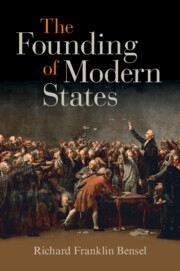Book contents
- The Founding of Modern States
- The Founding of Modern States
- Copyright page
- Dedication
- Contents
- Tables
- Boxes
- Preface
- 1 Introduction
- Part I The Founding of Democratic States
- Part II The Founding of Non-democratic States
- 5 The Dictatorship of the Proletariat
- 6 Blood and Soil
- 7 Islamic Theocracy
- 8 Conclusion
- Index
5 - The Dictatorship of the Proletariat
The Russian Revolution
from Part II - The Founding of Non-democratic States
Published online by Cambridge University Press: 27 October 2022
- The Founding of Modern States
- The Founding of Modern States
- Copyright page
- Dedication
- Contents
- Tables
- Boxes
- Preface
- 1 Introduction
- Part I The Founding of Democratic States
- Part II The Founding of Non-democratic States
- 5 The Dictatorship of the Proletariat
- 6 Blood and Soil
- 7 Islamic Theocracy
- 8 Conclusion
- Index
Summary
After Nicholas II, the Tsar of All the Russias, abdicated following mass demonstrations in Petrograd in March 1917, a committee of political leaders appointed by the Duma formed a Provisional Government.1 At the same time, workers and soldiers created a Petrograd Soviet of Workers’ Deputies (Petrograd Soviet) that both shared power with the Provisional Government and rapidly evolved into the leading component of the All-Russian Congress of Soviets.2 After the destruction of the Tsarist autocracy, the Provisional Government and Petrograd Soviet thus became the only sources of legitimacy for the Russian state. Since none of the competing social forces mobilized within the Provisional Government and the Petrograd Soviet was strong enough to provide an effective social base, each was stalemated in what turned out to be a paralyzing competition for political dominance. This competition played itself out while the Bolshevik Party infiltrated the factory, the army, and the navy. Once the party was confident of the support of the workers and troops in Petrograd, the Bolsheviks revolted against the Provisional Government, founded the new communist state under the auspices of the Soviet, and thus realized the ideological promise of a “dictatorship of the proletariat.” In founding the communist state, the Bolsheviks yoked their claim on sovereignty to the party’s dedication to carrying out a Marxist working-class revolution. They thus inhabited and gave a social purpose to a state apparatus that had been eroding while other social forces contended for control of the government.
- Type
- Chapter
- Information
- The Founding of Modern States , pp. 335 - 358Publisher: Cambridge University PressPrint publication year: 2022

